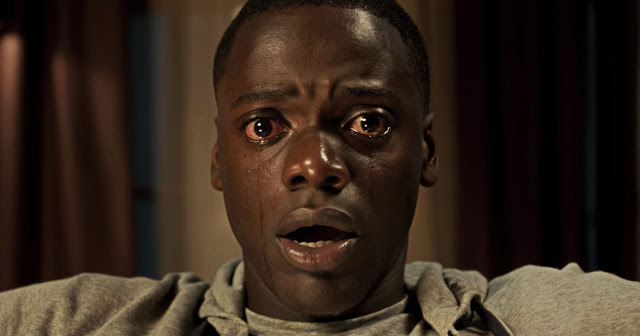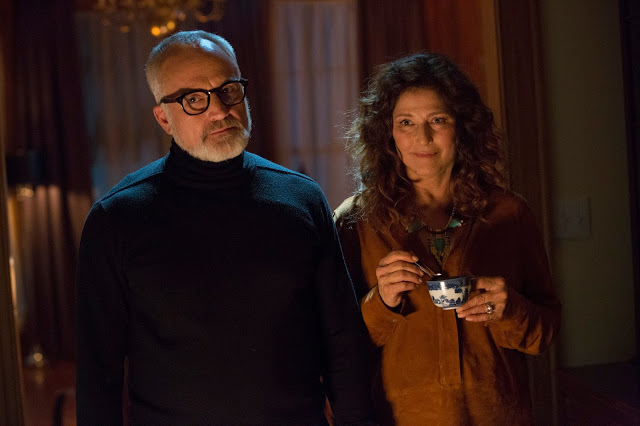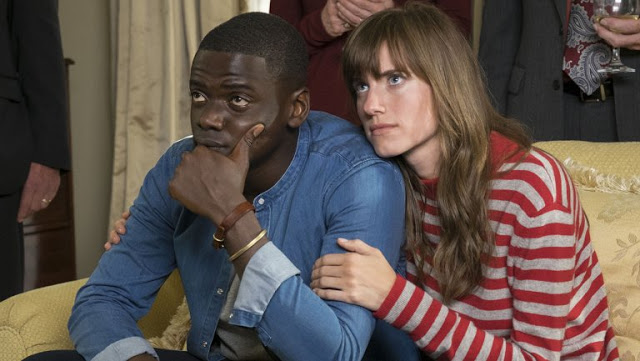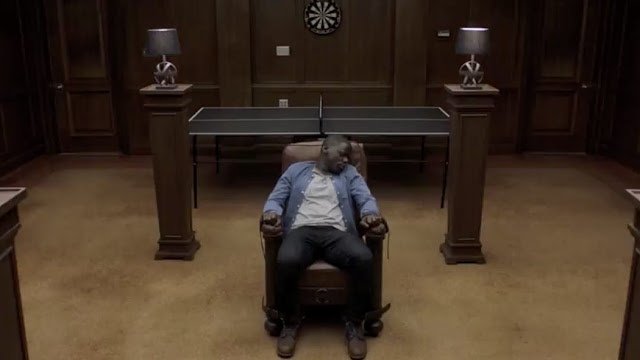The hero of Get Out suffers. Over the course of the movie, he is assaulted, humiliated, choked, tied up, shot at, and regularly deprived of his physical and personal liberty. It’s a crucible of pain. But nothing is more terrifying, more indignifying, than when he’s forced to hobnob at a fancy garden party with a bunch of rich white people.
OK, I’m exaggerating. But Get Out, the first feature by comedian Jordan Peele, is more than just another fright flick. It’s a film that examines, with insight, empathy, and anger, the challenge of being a black man in white America. Peele is not exclusively interested in making you jump out of your seat (though he proves plenty good at that). He also wants to clamp you to your chair and make you grapple with the current state of race relations in this country, to wrestle with his characters’ prejudices and maybe even your own.
The aforementioned, much-tormented protagonist of Get Out is Chris Washington (Daniel Kaluuya, star of my favorite Black Mirror episode), and if you ignore the movie’s chilling prologue—in which a black man is abducted by a masked figure on a darkened suburban street—its opening act could pass for a remake of Guess Who’s Coming to Dinner? A city-dweller, Chris is headed to the heavily wooded country (perhaps intentionally, the movie is vague about its location—filming took place in Alabama), along with his girlfriend, Rose Armitage (Allison Williams, forever Marnie). She’s introducing him to her parents, a prosperous couple who live in one of those daunting estates with a long, winding drive and a perfectly manicured lawn that seems to stretch on for acres.
It’s an intimidating place, but Chris does his best to acquit himself, and he’s welcomed openly by both Rose’s neurosurgeon father, Dean (Bradley Whitford, providing some linkage to the great horror-comedy The Cabin in the Woods), and her psychiatrist mother, Missy (Catherine Keener, forever awesome). Yet despite everyone’s warmest intentions, the dynamics are a bit strained; for a time, Get Out functions as an awkward comedy of manners, with its characters either visibly dancing around the fact of Chris’ race or painfully attempting to confront it. As Dean acknowledges, the mansion’s optics are regrettable, given that the lily-white Armitages employ two black servants: a housekeeper, Georgina (Betty Gabriel), and a groundskeeper, Walter (Marcus Henderson). And when guests arrive for the Armitages’ annual get-together, their behavior is of questionable taste—an elderly golf fan ensures Chris that he admires Tiger Woods, while a woman enviously clutches at his biceps. Even Rose’s booze-swilling brother, Jeremy (Caleb Landry Jones), can’t resist remarking on Chris’ genetic makeup during dinner.
If Get Out were a pure cringe comedy, one could perhaps accuse Peele of reductionism, of lazily tarring each of his white characters with the same brush of bigoted ignorance. As it turns out, however, this blanket crudity is the movie’s very point. The supporting players of Get Out are not people but symbols, proxies for a discriminatory society that perceives black men entirely by their skin color, prizing them not for their intellect or their personhood but for their physical attributes. (A scene where somebody Googles “top NCAA prospects” is a brilliant encapsulation of the characters’ myopia.) And as Peele gradually nudges the film deeper and deeper into horror territory, the implications of his allegory take on a darker and more disturbing dimension. To reveal too much would be to spoil the ingenuity of Peele’s screenplay, but suffice it to say that appealing to Rose’s parents is the least of Chris’ problems. He is in fact a target, a slab of prey in a hunt conducted by covetous white predators.
That is an explosive concept, and Peele deserves credit for making a genre picture that fearlessly tackles relevant social issues. At the same time, I am not entirely convinced that Get Out’s politics perfectly synchronize with its horror. Peele’s ideas are certainly intriguing, but they don’t quite fit together; rather than fluidly integrating its disparate pieces, Get Out often feels like a straightforward horror movie with some sociological commentary surgically appended.
Still, it’s a damn good horror movie, one that showcases Peele’s talent as a filmmaker as well as a provocateur. That prologue is a corker of a cold open, the camera smoothly tracking its subject and silently heightening your dread. Peele also builds suspense in observing the aberrant behavior of the servants, whose stilted personae—Georgina has a penchant for staring blankly into space, while Walter’s exercise routine is decidedly unorthodox—suggest that they’ve been lifted straight out of The Stepford Wives. Most importantly, Peele recognizes the value of patience, understanding that he doesn’t need to pile on the gore or the shocks to arrest your attention. The film’s best scene is a seemingly gentle tête-à-tête between Chris and Missy, where the latter, using nothing more than a dulcet tone of voice and a teacup, quietly bends the former to her will.
As Get Out accelerates into its third act, it settles comfortably into traditional horror territory, abandoning its spine- and brain-tingling setup in favor of grisly, blunt-force payoff. It’s a typical turn that’s somewhat disappointing for such an atypical movie. Even here, though, Peele proves adept, staging the bloodletting with intensity and wit. (A fake-out involving cotton balls is especially well-executed.) There are a few plot holes and contrivances, but they don’t much matter when the pacing is so fleet and the mayhem so precise.
At one point in Get Out, Missy soothingly commands Chris to “sink into the floor”, the punctuation to an impromptu hypnotism. What happens next is astonishing, both narratively and visually. And even if Peele can’t sustain that level of brilliance for the film’s entire run time, he repeatedly exhibits virtuoso flourishes that mark him as a truly gifted director. As a white man, I can’t pretend to fully appreciate Chris’ predicament. But I can assure you that, over the course of this smart and bracing movie, he wasn’t the only one hypnotized.
Jeremy Beck is the editor-in-chief of MovieManifesto. He watches more movies and television than he probably should.




